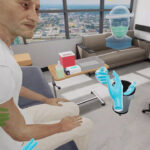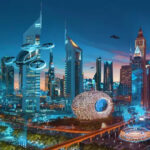In recent years, the term “metaverse” has been buzzing around the tech world, intriguing many with its promise of immersive, interconnected digital realms. While the metaverse concept is often associated with gaming and virtual reality, its potential extends beyond the gaming industry. One of the most exciting prospects lies in how the metaverse can support the tourism industry and promote culture and heritage.
What is the Metaverse?
The metaverse is a virtual universe where users can interact with each other and digital environments. This concept combines various technologies, including augmented reality (AR), virtual reality (VR), and artificial intelligence (AI), to create a seamless, immersive digital experience. In the context of tourism, this opens up a world of possibilities.
Virtual travel and tourism
One of the most evident ways the metaverse can impact the tourism industry is by providing virtual travel experiences to inspire tourists before they book a holiday. With advanced VR and AR technologies, users can explore destinations from the comfort of their homes and decide where they want to go and what they want to see in real life. It can help to make planning and booking a more accessible and more engaging experience.
These virtual travel experiences can be incredibly detailed and realistic, thanks to the high-quality graphics and immersive environments the metaverse offers. Users can wander through historic cities, trek through national parks, or dive into the deep sea to explore marine life without leaving their living rooms.
The metaverse can also make your visitor support stand out from other experiences. You can easily provide online customer interactions using different styles of chat functions that meet the needs of your visitors.
Preserving cultural heritage
The metaverse also plays a pivotal role in preserving cultural heritage. Cultural sites, monuments, and artefacts are often at risk from environmental factors, war, or the ravages of time. We can safeguard these treasures through digital replication and preservation in the metaverse for future generations.
Imagine walking through the ancient city of Petra, exploring the intricate temples of Angkor Wat, or admiring the art of the Louvre Museum, all in a digital realm. This preservation effort helps protect these invaluable cultural assets and makes them accessible to a global audience, transcending geographical boundaries.
Educational and Historical Exploration
The metaverse isn’t limited to offering mere simulations; it can also serve as an educational platform. Students and history enthusiasts can immerse themselves in historical events, bringing the past to life. Whether it’s experiencing the Renaissance in Florence, witnessing the signing of the Declaration of Independence, or exploring the mysteries of Machu Picchu, the metaverse can be a powerful tool for learning about history and culture.
Moreover, these educational experiences can be gamified, making learning fun and engaging. Users can interact with historical figures, solve puzzles, and participate in historical reenactments, all while absorbing valuable knowledge about the world’s cultural heritage.
Connecting People and Communities
The metaverse isn’t just about observing from afar; it’s about connecting people and communities. Users worldwide can unite in shared virtual spaces, fostering cross-cultural understanding and dialogue. Cultural exchange programs can occur in the metaverse, enabling individuals to experience other regions’ customs, traditions, and cuisines. This exchange of ideas and experiences contributes to a richer, more interconnected global society.
Additionally, local communities can benefit from metaverse-based tourism. Communities can attract a global audience by creating immersive virtual experiences that showcase their culture and heritage. This digital tourism can stimulate economic growth and help preserve local traditions and practices.

The metaverse is poised to revolutionise the tourism industry and the preservation of culture and heritage. By leveraging the power of this digital universe, we can create a more accessible, interconnected, and culturally rich world. As we delve deeper into the metaverse, it becomes evident that its potential is limitless, and its impact on the tourism industry and cultural heritage will be profound.
At Metaverse Hub, we support customers across tourism and heritage to create engaging interactive experiences. Our 3D platform is the most customisable in the marketplace. Using Metaverse Hub, you can create your own space, develop a digital twin and use AR to bring buildings and objects to life.
Take a look at our latest project, an anti-racism virtual world.
In 2022, the Welsh Government announced that it was committed to ensuring Wales will be an anti-racist country by 2030 – the first country to make this commitment. A crucial part of its Anti-Racist Wales Action plan has been to develop an anti-racist curriculum.
The curriculum is in the form of a metaverse – the first anti-racist virtual world. This innovative development, led by Cardiff and Vale College on behalf of the Welsh Government, provides an accessible and immersive learning experience developed and produced in collaboration with ethnic minority experts from schools, colleges, universities and third parties.
Explore the metaverse here: https://www.antiracism.wales/
Quelle:



